To kick off my spring trip to Malaysia, I flew ANA business class from Vancouver to Tokyo on the 787-9 Dreamliner, before continuing the journey onwards to Kuala Lumpur.
I had previously flown on the ANA 787-8, but this would be my first time flying on the 787-9. There are a few subtle differences between the two variants of ANA’s Dreamliner business class, so I figured I would review the 787-9 experience in-depth as well – especially given the fact that Vancouver–Tokyo on ANA is a route that many Aeroplan members will be booking as one of the program’s best sweet spots.
Note that ANA also has a newer business class known as “The Room” on their Boeing 777s, which I’ve also flown before; however, The Room is only offered on select routes to the US and Europe at the moment, so if you’re flying into or out of Vancouver, you’ll most likely find yourself on the 787-9.
In This Post
- Booking
- Cabin
- Seat
- Amenities
- Meal Service
- In-Flight
- Entertainment
- Bed
- Second Meal Service
- Conclusion
ANA 787-9 Business Class – Booking
I booked this journey from Vancouver to Tokyo and then onwards to Kuala Lumpur for 85,000 Aeroplan points, all in ANA business class on the Boeing 787-9 on both legs.
While flying this route to Southeast Asia for 85,000 Aeroplan points is already a pretty great deal, you also can book just the ANA business class flight from Canada to Tokyo for as few as 55,000 Aeroplan points, which is truly one of the best Aeroplan sweet spots.
Availability on this route can be hard to come by, so it’s best to book as far in advance as possible. In my case, I was lucky to find two award seats relatively last-minute when planning my Malaysia trip, so I made sure to snap them up as soon as possible.
I feel like I got pretty lucky here, since presumably there was plenty of last-minute space due to Japan not being open for tourism just yet. Going forward, I wouldn’t count on finding last-minute flights as easily for future bookings, and I’d recommend lining up the award space far in advance if you can.
ANA 787-9 Business Class – Cabin
I spent some time at the Air Canada Maple Leaf Vancouver before heading onto my flight, making sure to go easy on the lounge snacks to keep my appetite ready for the in-flight offerings.
Stepping onboard the plane, I was overjoyed to be back within the ensconces of an ANA premium cabin, one of my favourite airlines, for the first time since the pandemic.

ANA uses a staggered business class seat on their 787-9s in a 1-2-1 configuration, with a total of 40 business class seats arranged across 11 rows.
The seats are split across a main cabin of eight rows and a mini-cabin of two rows, with both cabins also featuring an additional row that only has window seats and no middle seats.
The finishes of the cabin interior consist of deep blues and muted greys. It’s a rather industrial look which might not be the most visually appealing by today’s aesthetic standards, especially compared to the newer, more sophisticated look of “The Room” on the Boeing 777.
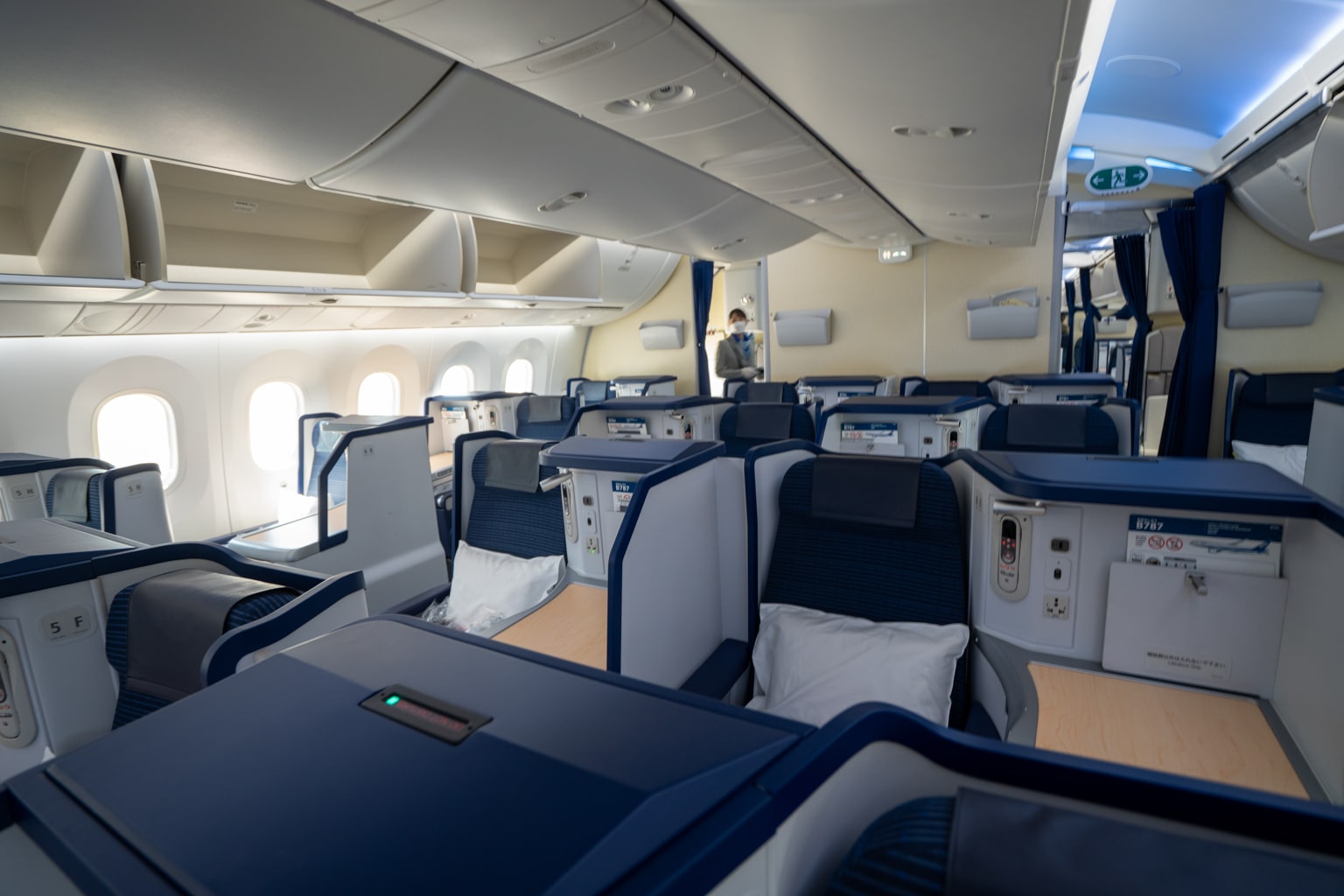
The seats on the 787-9s are newer than what you’ll find on the 787-8, with more modern features and finishings. However, it’s still not exactly cutting-edge and is starting to show its age, which is why ANA has begun refreshing its business class with a brand-new product on the 777.
The window seats on ANA business class alternate between being closer to the window (in even-numbered rows) or closer to the aisle (in odd-numbered rows). The even-numbered window seats would be ideal for solo travellers, offering maximum privacy and the best window views.
Meanwhile, the middle seats may be ideal for those travelling as a couple. Each seat has a side table adjacent to it, so you’ll still have some distance between you seatmate while being able to communicate easily.


Since Jessy and I were travelling together, we had chosen the Seats 5D and 5F in the middle of the main cabin. However, we found the cabin pretty crowded upon boarding, so we ended up asking to move to Seats 8E and 8G at the back of the cabin for more privacy from other passengers.
ANA 787-9 Business Class – Seat
At the front of the seat is an 18-inch touch-panel entertainment screen. Just below that is the footwell with a small storage pocket underneath for placing your shoes.
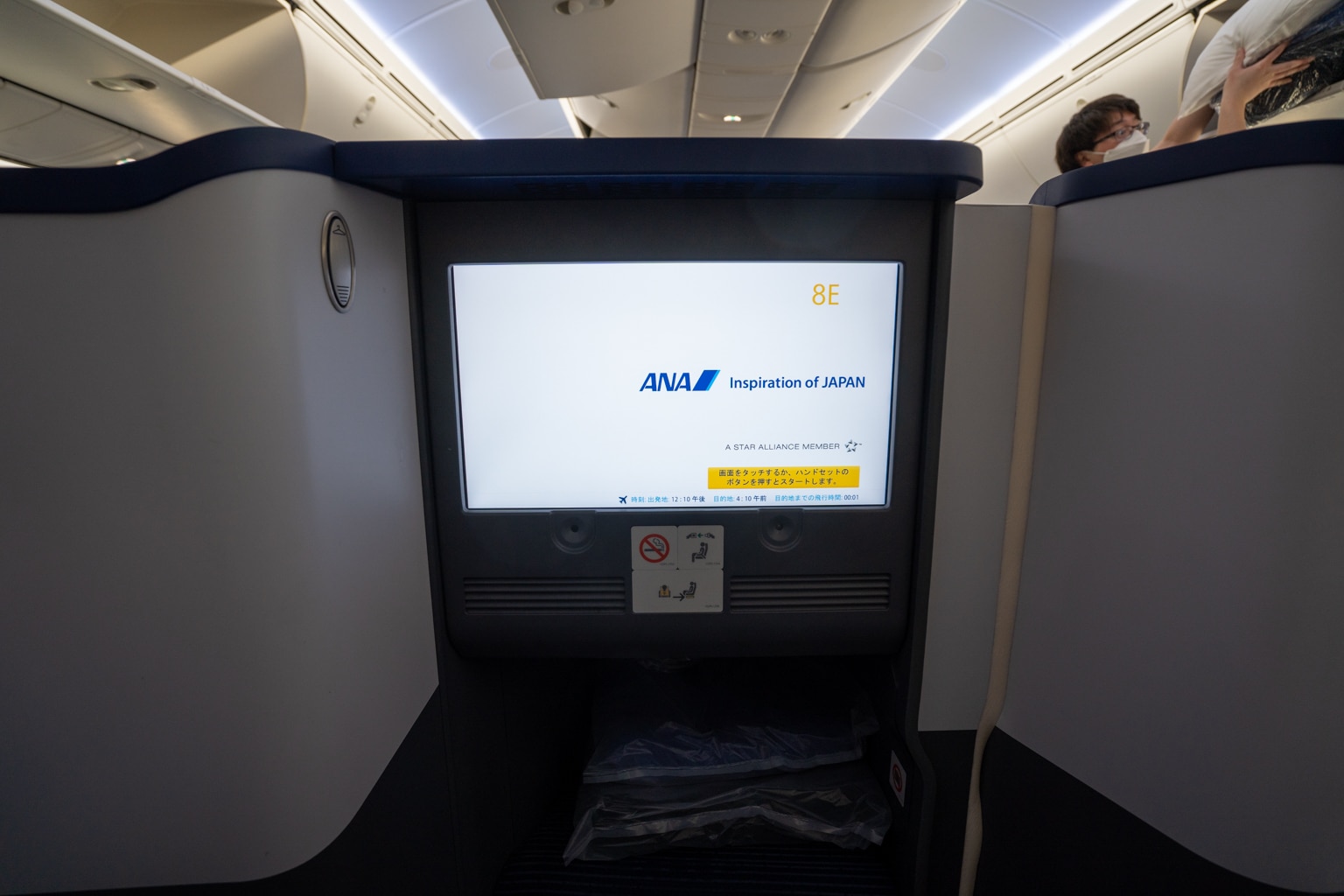

Each seat has a decent amount of surface space on the console next to you. The side table will be located to your right if you’re sitting in an odd-numbered row, and to your left if you’re in an even-numbered row.

You’ll find here a reading lamp, universal power outlet, USB port, and remote control for the entertainment screen. There’s also a small pocket with literature storage above the side table.

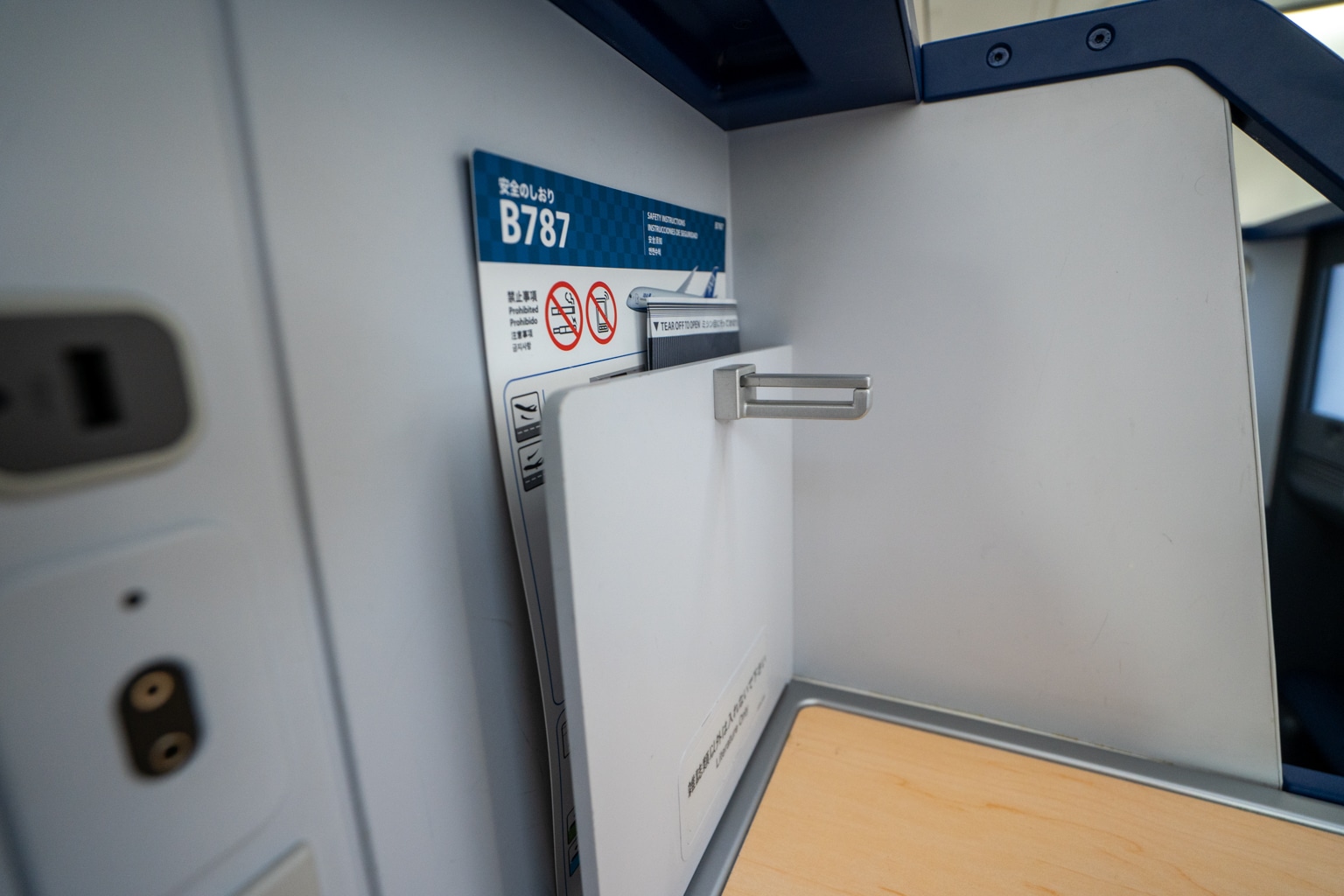
A handful of older-generation seat controls can also be found along the side of the seat console, allowing the seat to be adjusted to your preference or placed in lie-flat mode.
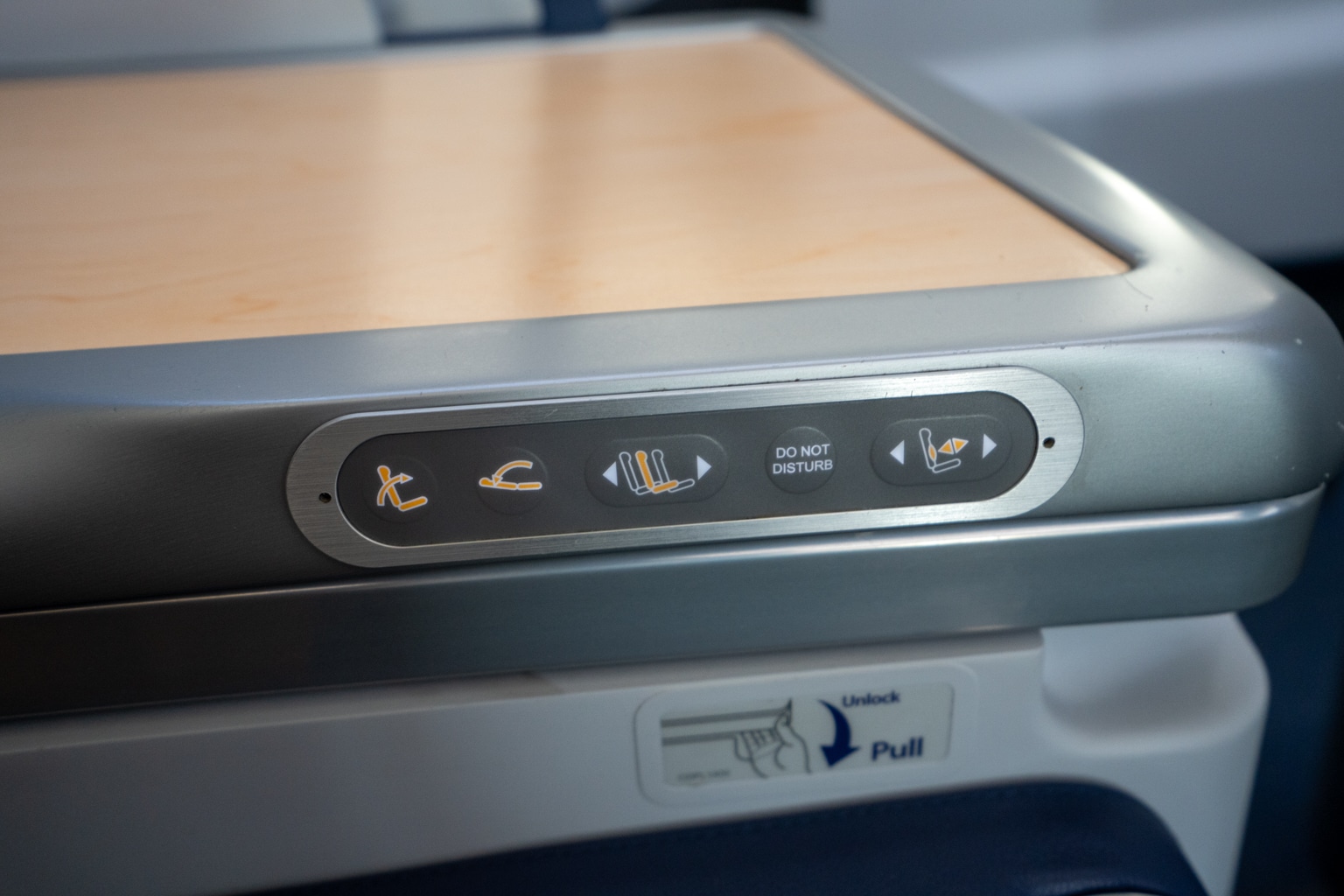
From the inner surface of the seat console, the tray table can be unlatched and maneuvered into place in front of you.
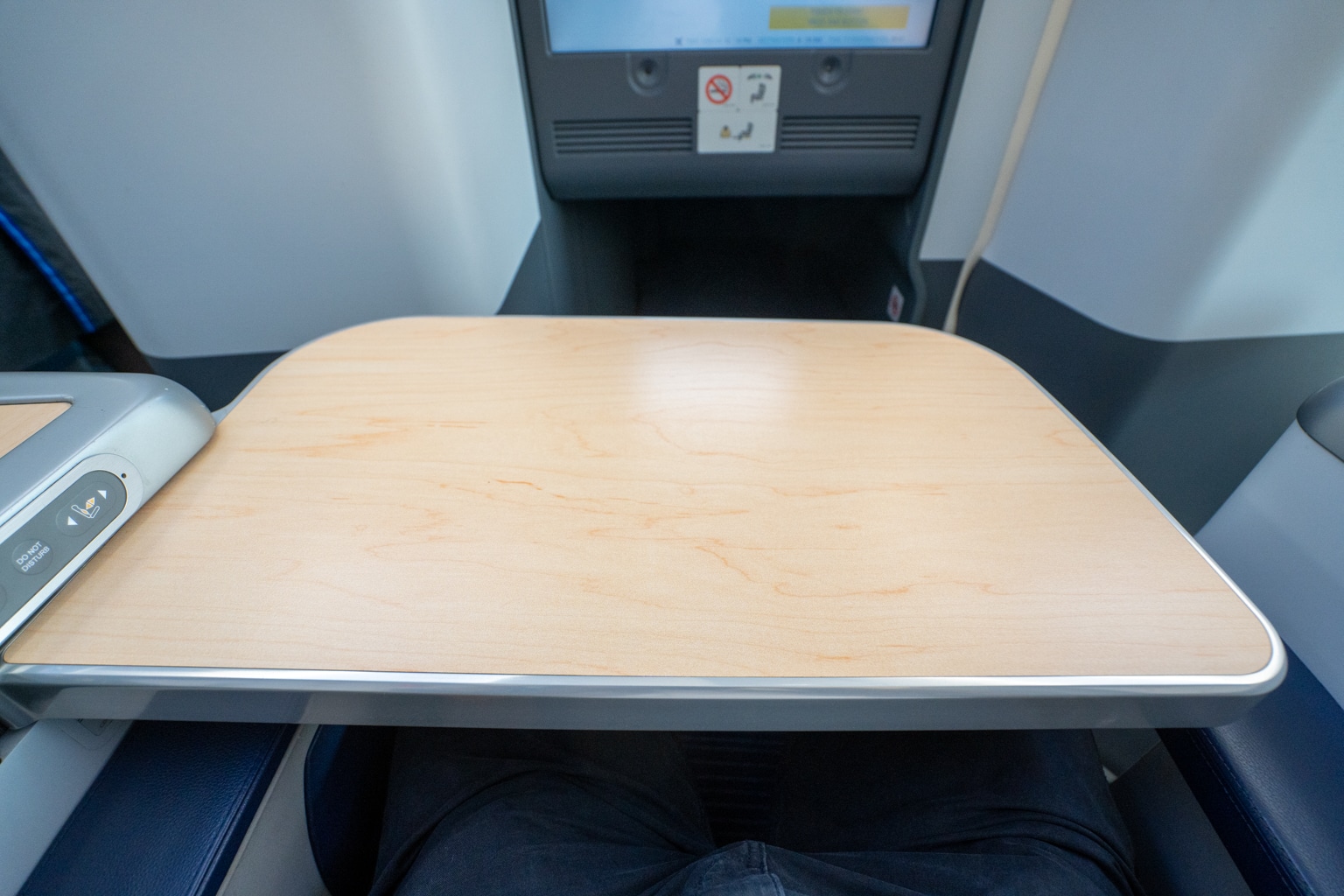
Lastly, between the two middle seats, there’s a privacy divider that can be manually pulled back or forward, depending on whether or not you’d like to chat with your seatmate.

ANA 787-9 Business Class – Amenities
For departures out of Vancouver, the crew prefers to leave most of the business class amenities at your seat prior to boarding rather than hand them out prior to the departure. Indeed, we arrived at our seats to find a blanket, pillow, slippers, headphones, and an ANA amenity kit waiting for us.

The ANA business class amenity kits is supplied by the UK-based Globe-Trotter luggage brand. This kit was a bright pink leather, but ANA rotates colours and designs throughout the year.
The amenity kit consisted of an eye mask, earplugs, toothpaste, as well as lip balm and face mist from Japanese cosmetics brand SHIRO. It certainly wasn’t the most jam-packed amenity kit you’ll find out there, but it’s on par with what you’ll find on most business class products these days.


I changed into the slippers to get comfortable for the 10-hour journey ahead as we prepared for takeoff.
The crew also came by to pass around some pre-departure welcome drinks, which included champagne, juice, and water. Naturally, we opted for the champagne despite the noon takeoff time – if anything, as a way to get a head start on acclimating to the Asia time zone.

ANA 787-9 Business Class – Meal Service
As we took off for Japan, I was feeling thrilled to be flying across the Pacific once again, given how long it had been since I had been back to Asia.
Shortly after takeoff, the crew came around to distribute the in-flight menus. ANA’s business class menu comes with a deep-blue cover, mirroring the design touches of the cabin itself.
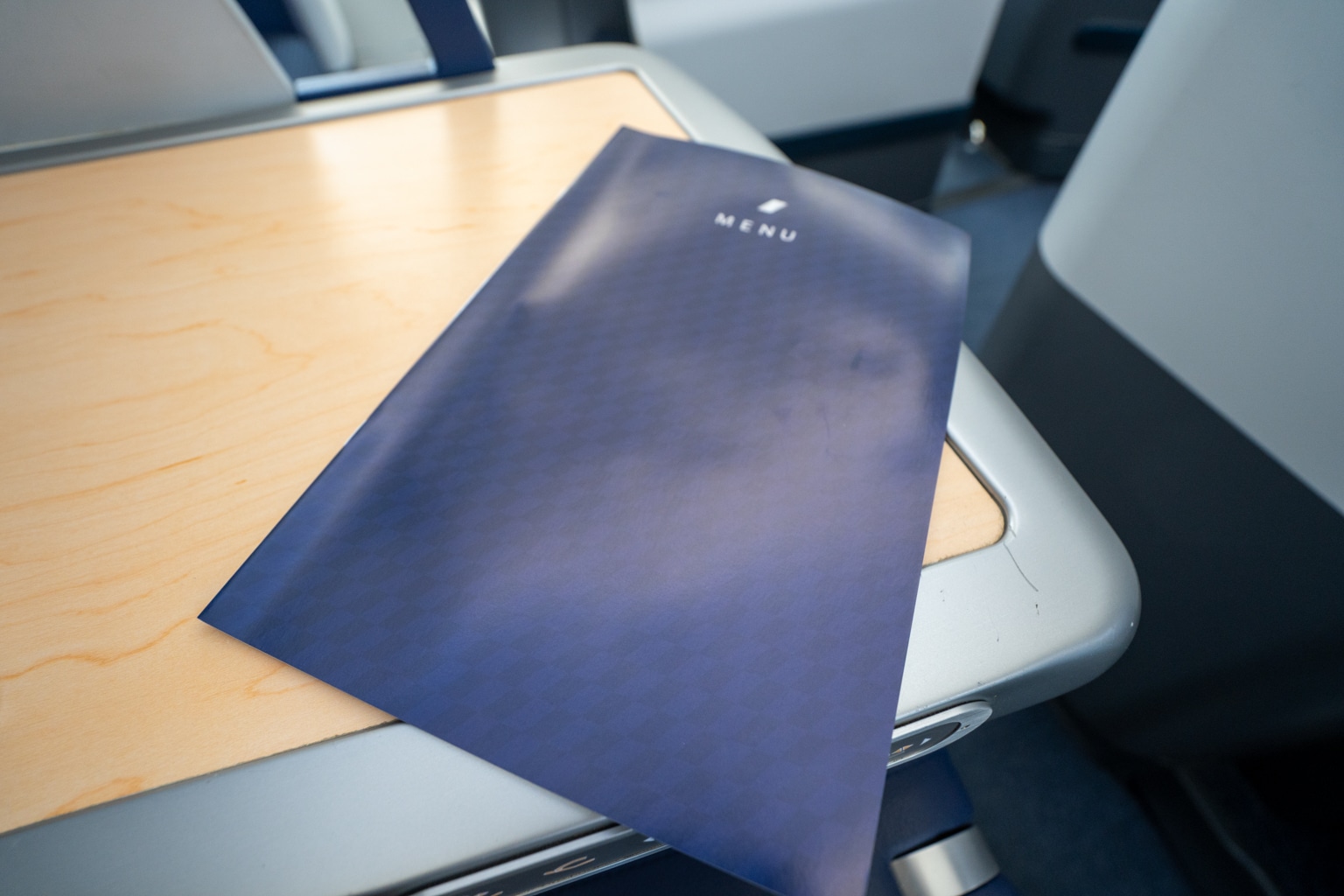
The food and drink selection read as follows:
As is customary on ANA flights, the menu offered a choice between a Japanese and Western meal for both the first and second meal services, and guests are encouraged to pick one of the set menus for each of their meals.
I naturally went for the Japanese option, as I’m always thrilled to experience Japanese cuisine whenever I’m flying with a Japanese airline. This flight was no exception, and indeed, the irony of flying with transiting via Tokyo with ANA while not being able to enter Japan was a source of motivation to consume as much Japanese food as I could.
I asked to start the food and drink processions with a glass of the Duval-Leroy champagne, and then switched to the sake to accompany my meal.


The Japanese menu was a washoku multi-course meal, beginning with an amuse bouche, followed by a selection of appetizers served on one plate.
I don’t eat mushrooms, so I gave the mushroom mousse tartlet amuse to Jessy, who found it quite tasty. Meanwhile, I enjoyed the ham-wrapped apricot, which opened my palate nicely for the indulgences to come.
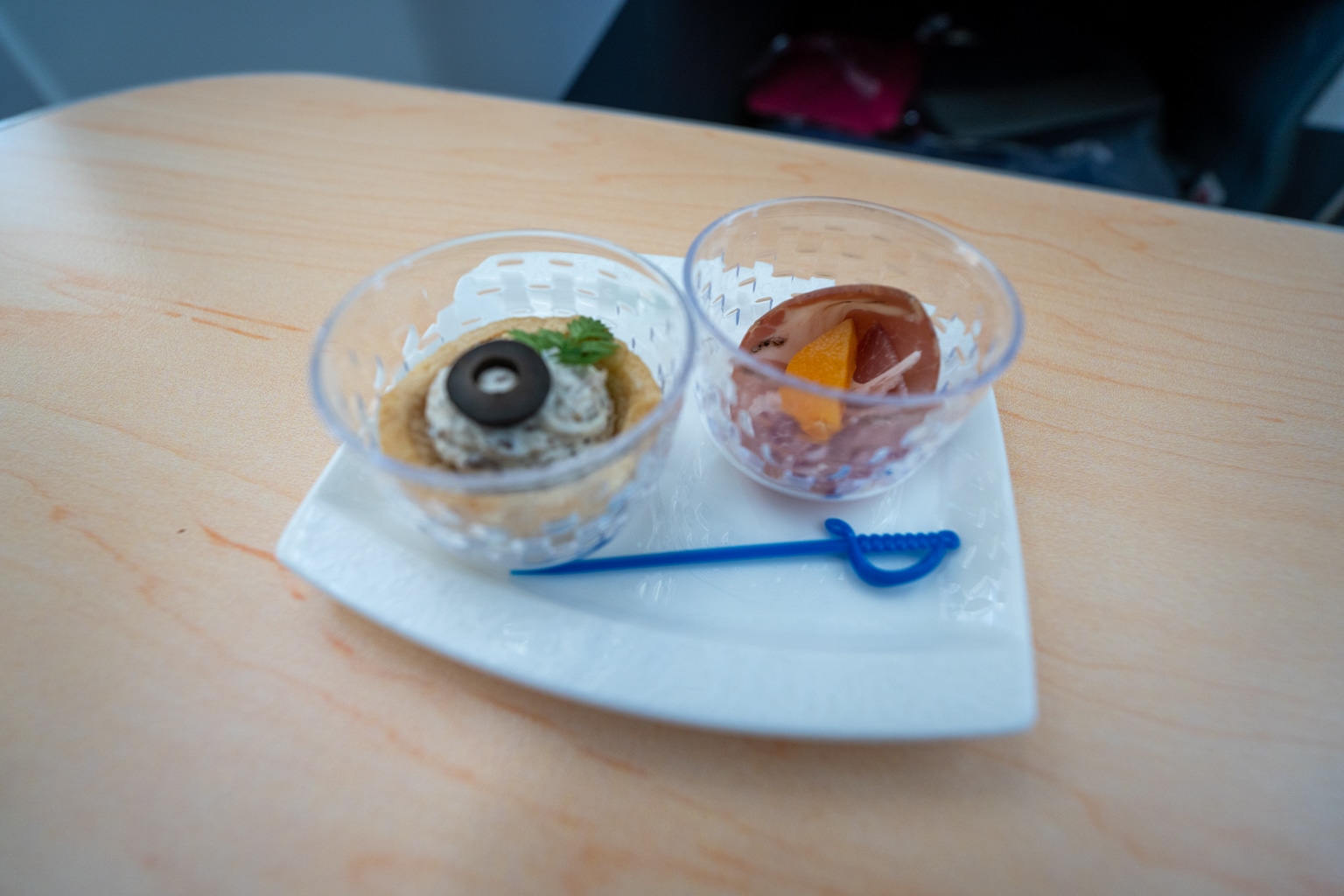
I then swapped out my champagne for some of the Masuizumi Junmai sake, a fruity variety that nicely complemented the seafood-heavy Japanese appetizers and main course.

For the appetizers, ANA served up a trio of marinated scallops, a selection of tasty morsels, and sashimi.
The sashimi really hit the spot, and was both packed with flavour and easy on the tongue with a tender texture. Furthermore, I thought the presentation was beautifully done, with the pieces of fish wrapped into flower shapes and topped with roe.


I always find the “selection of tasty morsels” to be one of the best things about flying with Japanese airlines, and this flight with ANA was no different. It’s so much fun to try every small bite and look back on the menu to figure out what I’ve just eaten.
I found the surf clam vinegar with miso to be innovative and pleasant, while the jellied monkfish liver was delicate, delicious, and paired well with the miso. Meanwhile, the king crab meat with broad beans and potato sauce, served in a tiny glass bowl, certainly had an interesting Western twist.
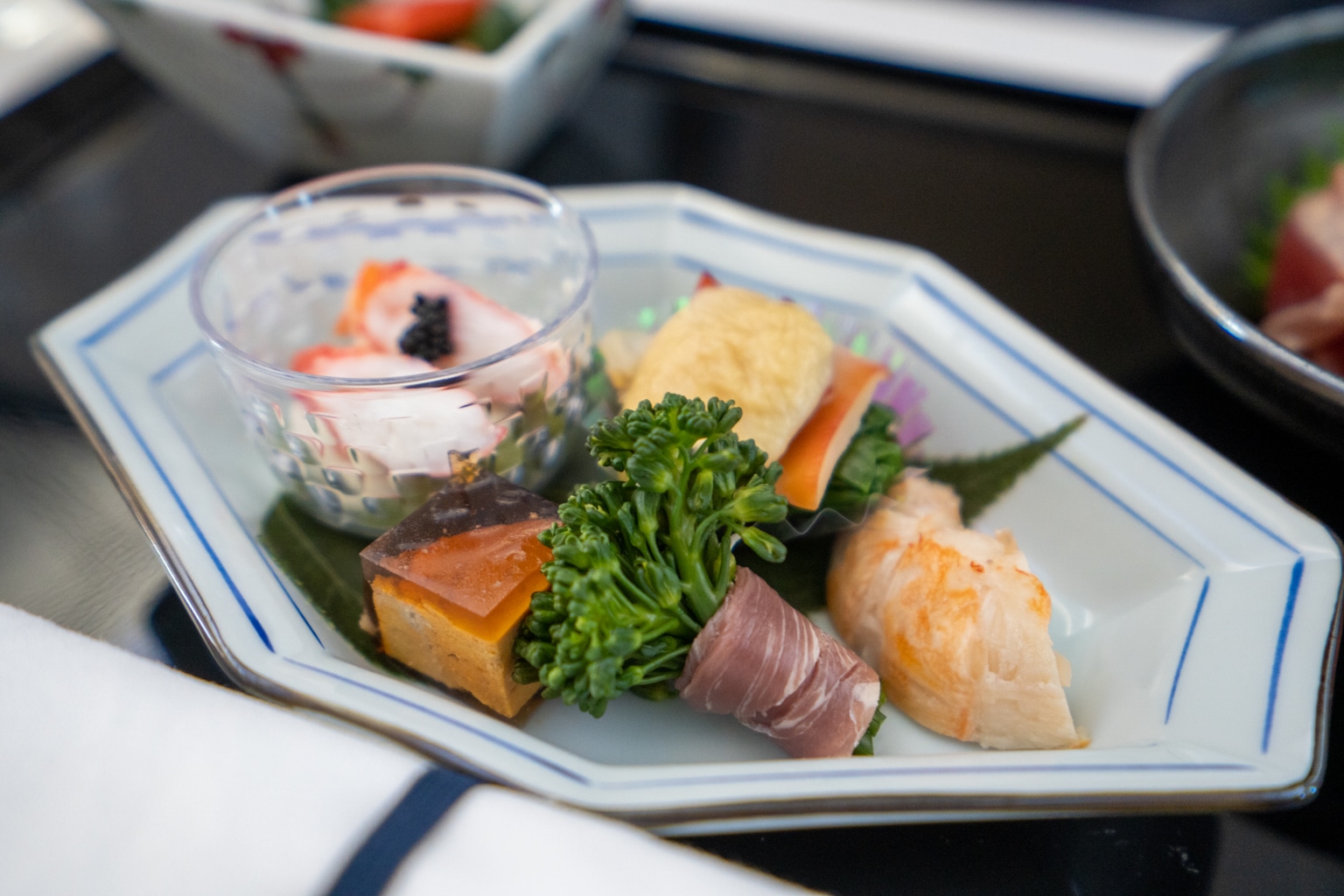
Meanwhile, the scallops seemed almost ordinary in comparison, but their texture was succulent and they carried beautiful flavours of the sea.

The main course was served next: grilled trout with steamed rice, miso soup, and Japanese pickles.

As I mentioned, I was very hungry and eager to sample as much of the menu as possible, so alongside the main course, I also ordered a bowl of Ippudo ramen.
The ramen is technically from the snack menu, but I asked the crew to prepare it anyway, and they dutifully served up a rich and decadent bowl alongside my main course.

The fish flavours came through beautifully – light and not too salty, with a delicate texture. Still, as someone who misses the aromas of Tokyo’s ramen joints more than anything right now, I preferred the Ippudo ramen out of my two main courses.
After a series of main courses that were highly impressive in both quality and quantity, I wrapped up the main course with some ice cream, tea, and a fruit plate.

It’s worth noting that the ice cream was served extremely hard, and I had to chip away at it over the course of 10 minutes in order to enjoy it properly. Still, it was a satisfying conclusion to the meal service once I got the ice cream to melt a little bit.
Overall, I found lunch on ANA business class to be delicious from start to finish, with a very carefully arranged presentation adding to the fulsome flavours and making for a dining experience that was every bit as satisfying as I remembered from past ANA flights.
ANA 787-9 Business Class – In-Flight
I purchased a full flight Wi-Fi plan and worked for the next few hours. I ordered a hojicha – smoked Japanese green tea – to enjoy while I caught up on some work, intending to sample as much of the beverage menu as I could, just as I had done with the food menu.

After a few hours, I was still feeling peckish, so I ordered a trio of snacks and drinks to continue nibbling away at.
I opted for the rice bowl with ginger-fried pork, corn soup, and ANA’s original kabosu citrus drink. All three were delectable, especially the rice bowl, which was deliciously seasoned.

Meanwhile, the corn soup had a smooth texture with a nice balance of umami and sweet flavours, while the kabosu citrus drink was the ideal refreshing drink to sip on in the middle of a long flight.
ANA 787-9 Business Class – Entertainment
In-flight entertainment is provided by ANA Sky Channel, offering a mix of TV shows, Hollywood blockbusters, and Japanese titles.
As is sometimes the case on Asian carriers, the entertainment selection for English-speaking audiences may not be as wide-ranging as other airlines.
The programs can be accessed via the seat monitor or the ANA app on portable devices.


ANA 787-9 Business Class – Bed
Prior to napping for a few hours, I visited the business class restroom to freshen up.
I found the restroom in the galley between the two business class cabins to be quite narrow, even for a Dreamliner. Despite the limited space, the restroom still managed to fit in a fold-down baby changing table.


The restroom was also equipped with a few amenities, such as extra toothbrushes, face wipes, and mouthwash.

After washing up, I headed back to the main cabin, and decided to take a nap in the vacant Seat 8K over by the windows.
The ANA 787-9 business class seat is six feet long when fully extended, and there’s a mattress pad that you can put down for additional comfort.

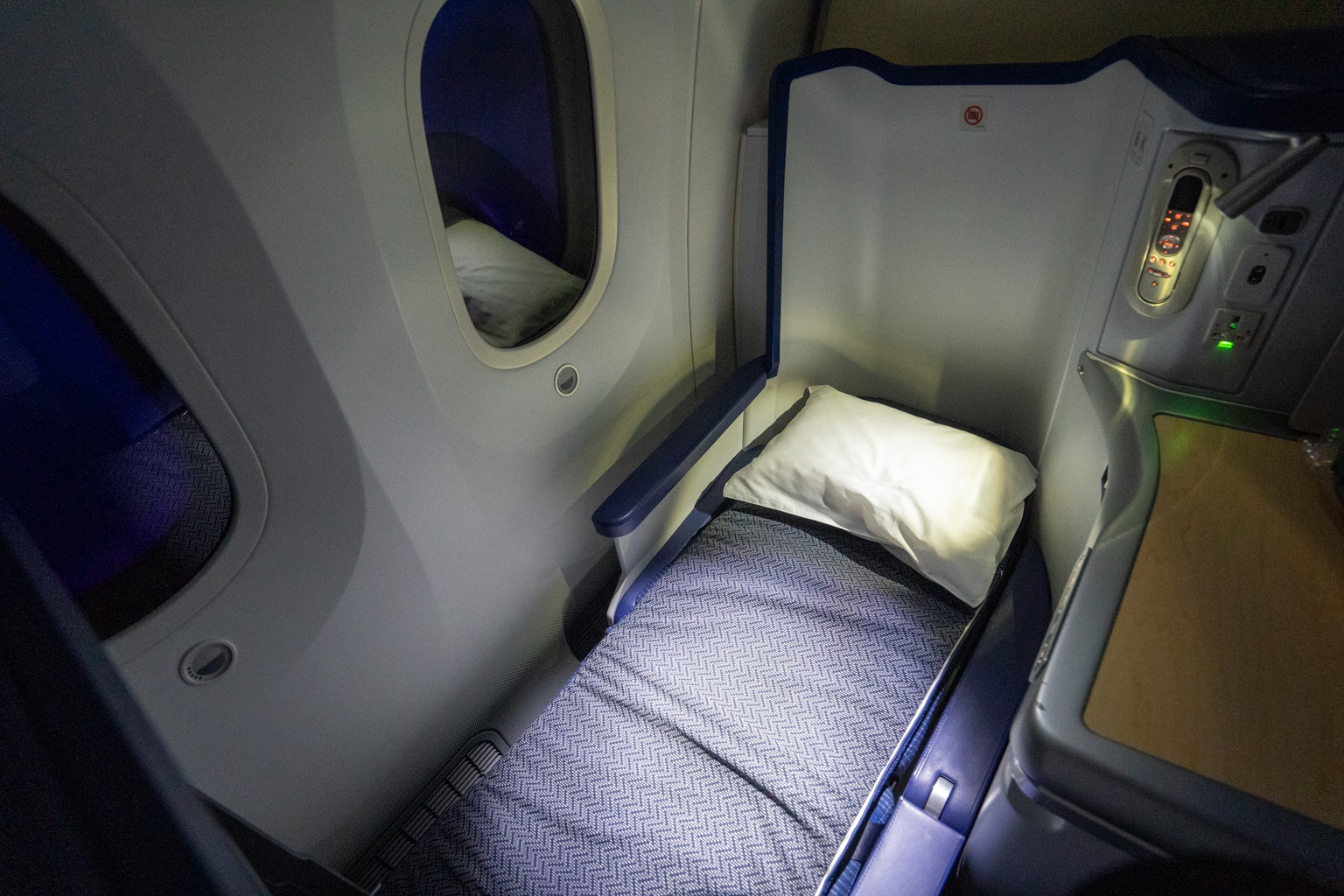
The staggered nature of the seats means the footwell goes quite deep, almost to your thigh, so there’s limited space to toss and turn. On the plus side, there’s enough space to move your feet around, as the footwell doesn’t get narrower at the base like you’ll find on some other business class seat types.
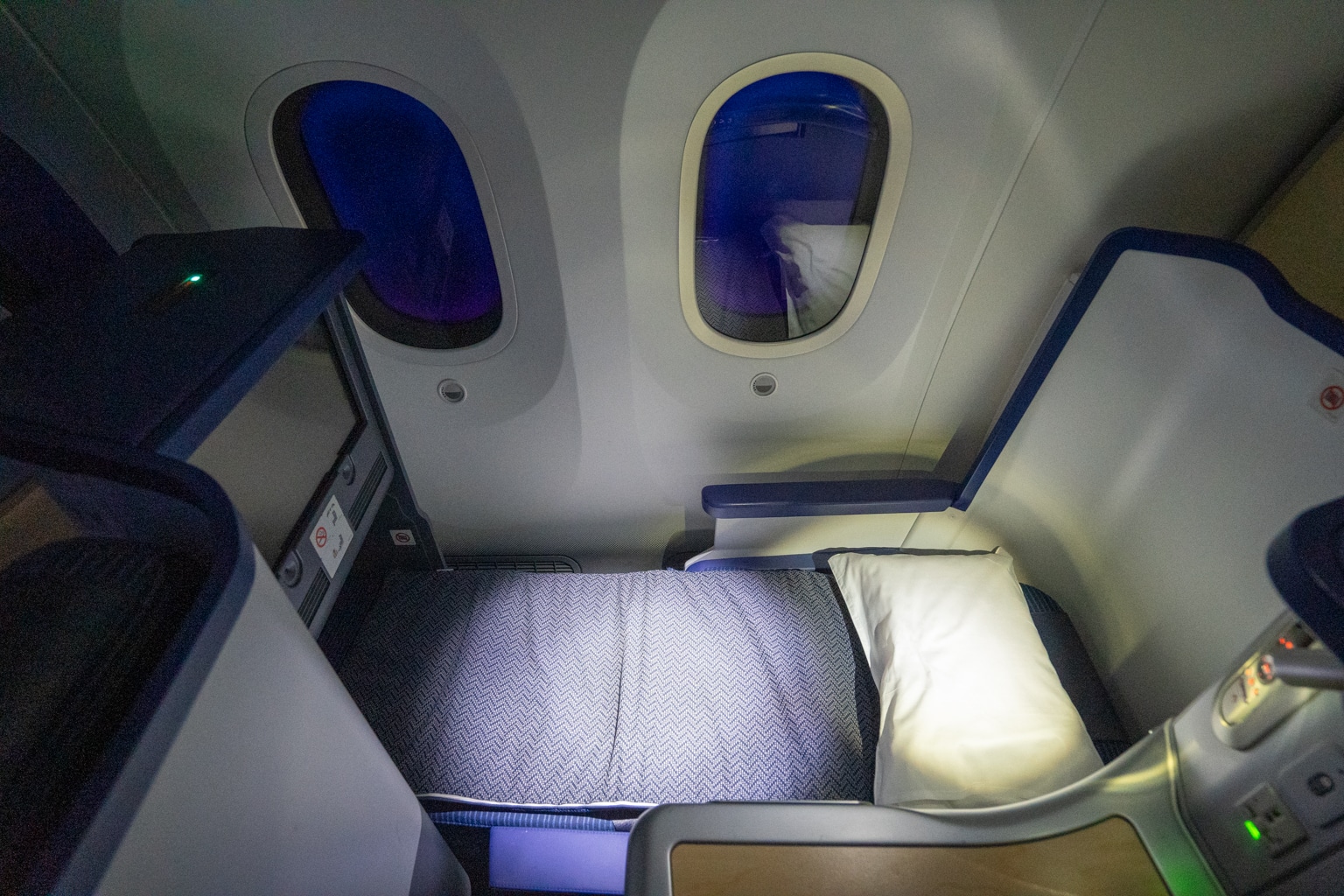
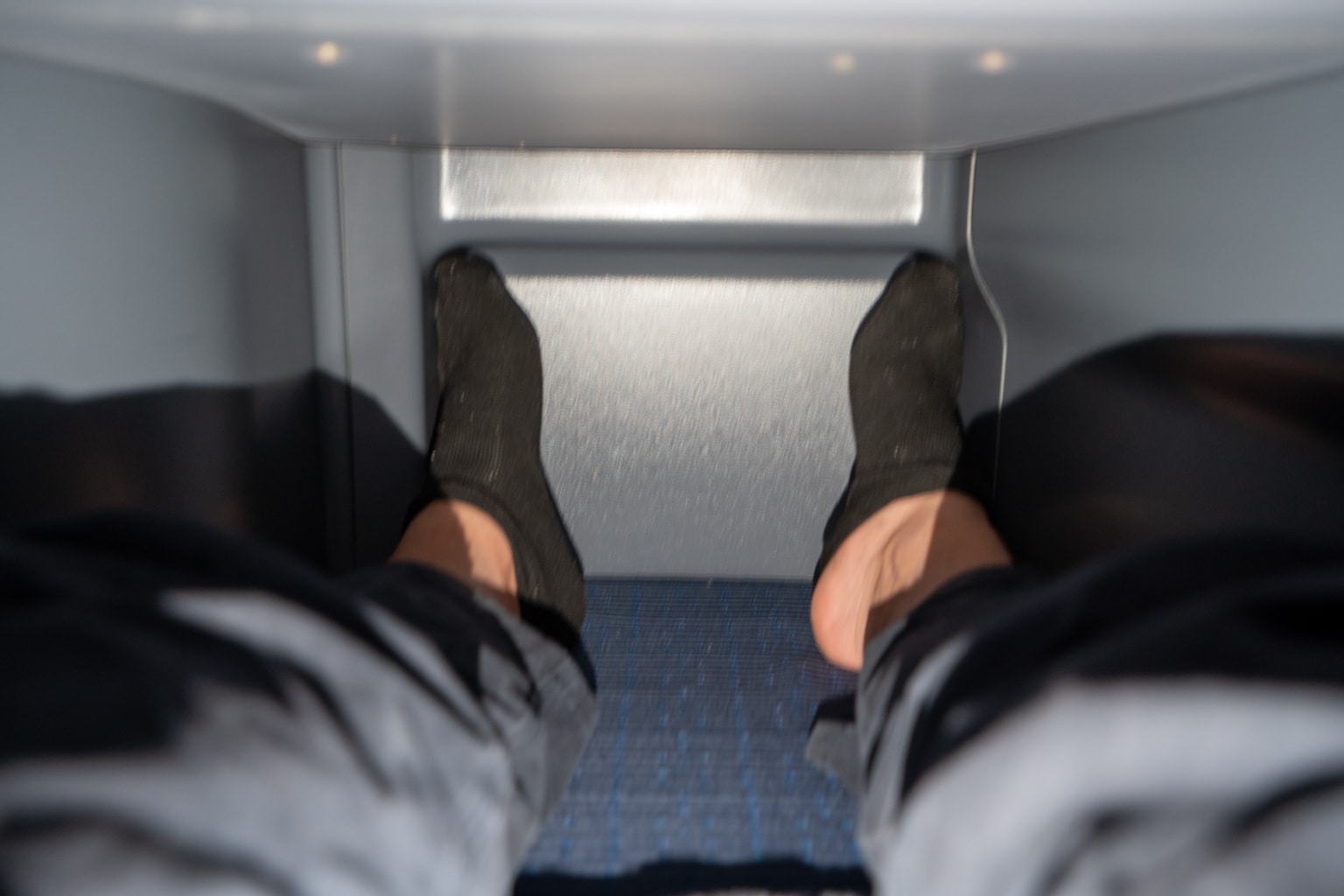
After the meal service concluded, the cabin lights were dimmed for most of this transpacific crossing to help passengers get some rest and prepare to arrive in a different time zone.
I slept for a couple of hours even though it was still only the afternoon Pacific Time, staggering my sleep to prepare for an eventual midnight arrival in Malaysia at the end of the journey.

ANA 787-9 Business Class – Second Meal Service
After my nap, I ordered a few more drinks: iced green tea, plus a dashi soup served in a cup.
The soup was pretty tasty with a strong umami flavour. It wasn’t very filling, but that wasn’t a problem, as the second meal service would begin shortly thereafter.

For my second meal, I decided to try out another sake from the menu, this time the Shichida Junmai Daiginjo with a slightly stronger proof.

The meal presentation was, again, very lovely. ANA loves to serve a small square of rice wrapped in paper, which is always a special touch and one of the “little things” to look forward to whenever you’re flying with this airline.

In terms of taste, the second meal was just as delicious as the first, though not quite as memorable in terms of the sheer variety and culinary creativity that was on display with the washoku procession a few hours earlier.
The tray of fish, vegetables, and other tasty tidbits concluded the flight in style as we began our gradual descent into Tokyo Narita.
I sat in the window seat to look out over the Japanese countryside, feeling rather wistful at the fact that we’d only be transiting through a destination that we continue to wait with angst to visit once again.

A return to Japan felt so close, yet so far away, as we landed in Tokyo only for a few hours en route to Malaysia.
Conclusion
With this 10-hour flight across the Pacific, I’m pleased to report that the ANA business class experience remains as strong as pre-pandemic.
If you’re flying on the Boeing 787-9 Dreamliner, the “boxy and blue” seat design will be comfortable, but not cutting edge. You’ll still have a great onboard experience, whether you’re flying solo or as a couple.
I’d love to see ANA continuing to refurbish their cabins with more of the new business class seats that we see on the 777s, which, when paired with their outstanding onboard food and drink, would truly elevate ANA’s overall business class offering into the leagues of the world’s best.
Even on the Dreamliner, though, with the Vancouver–Tokyo bookable for 55,000 Aeroplan points, ANA business class is certainly an experience to seek out for yourself as you plan your future travels to Japan and Asia.




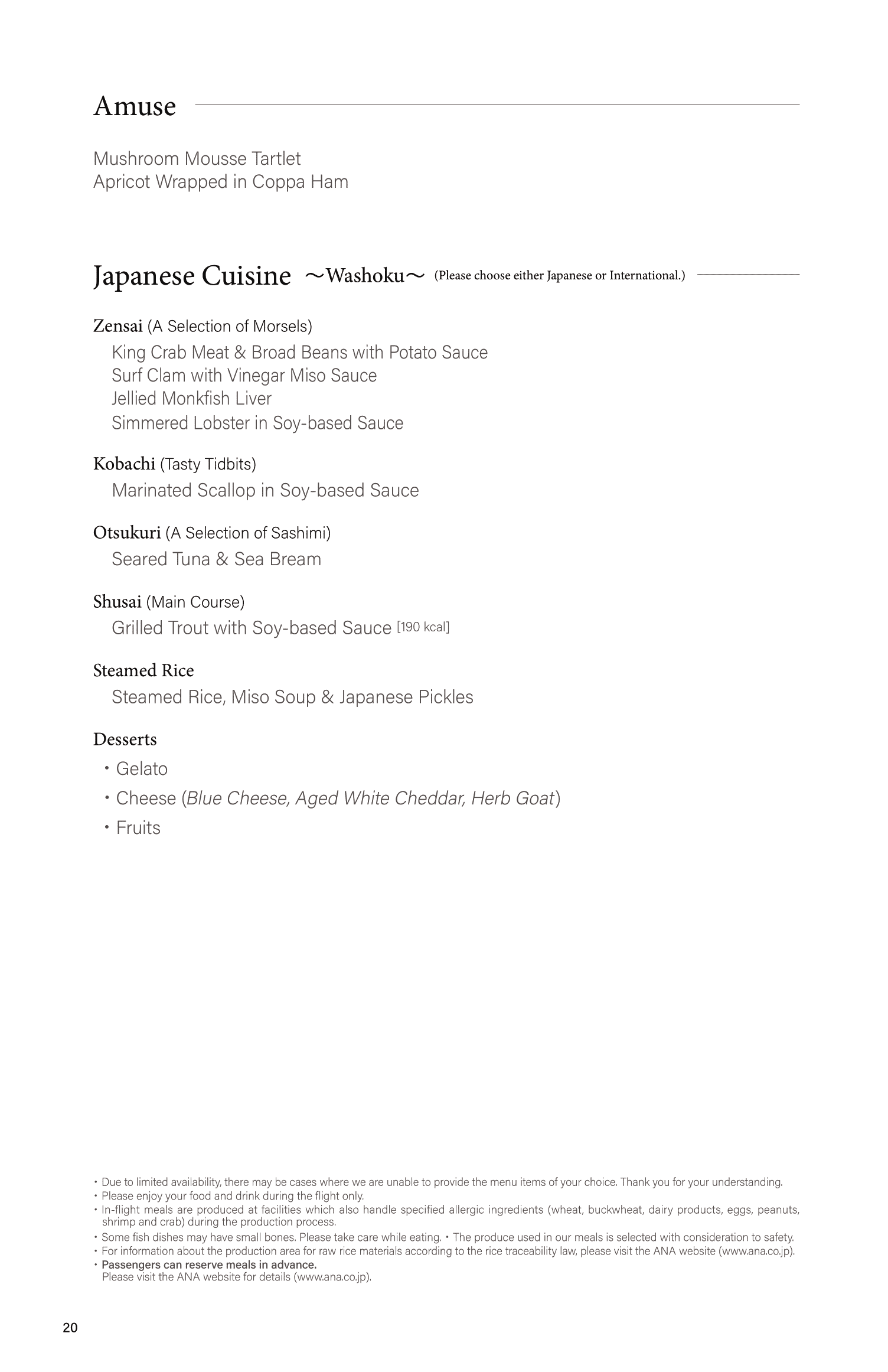
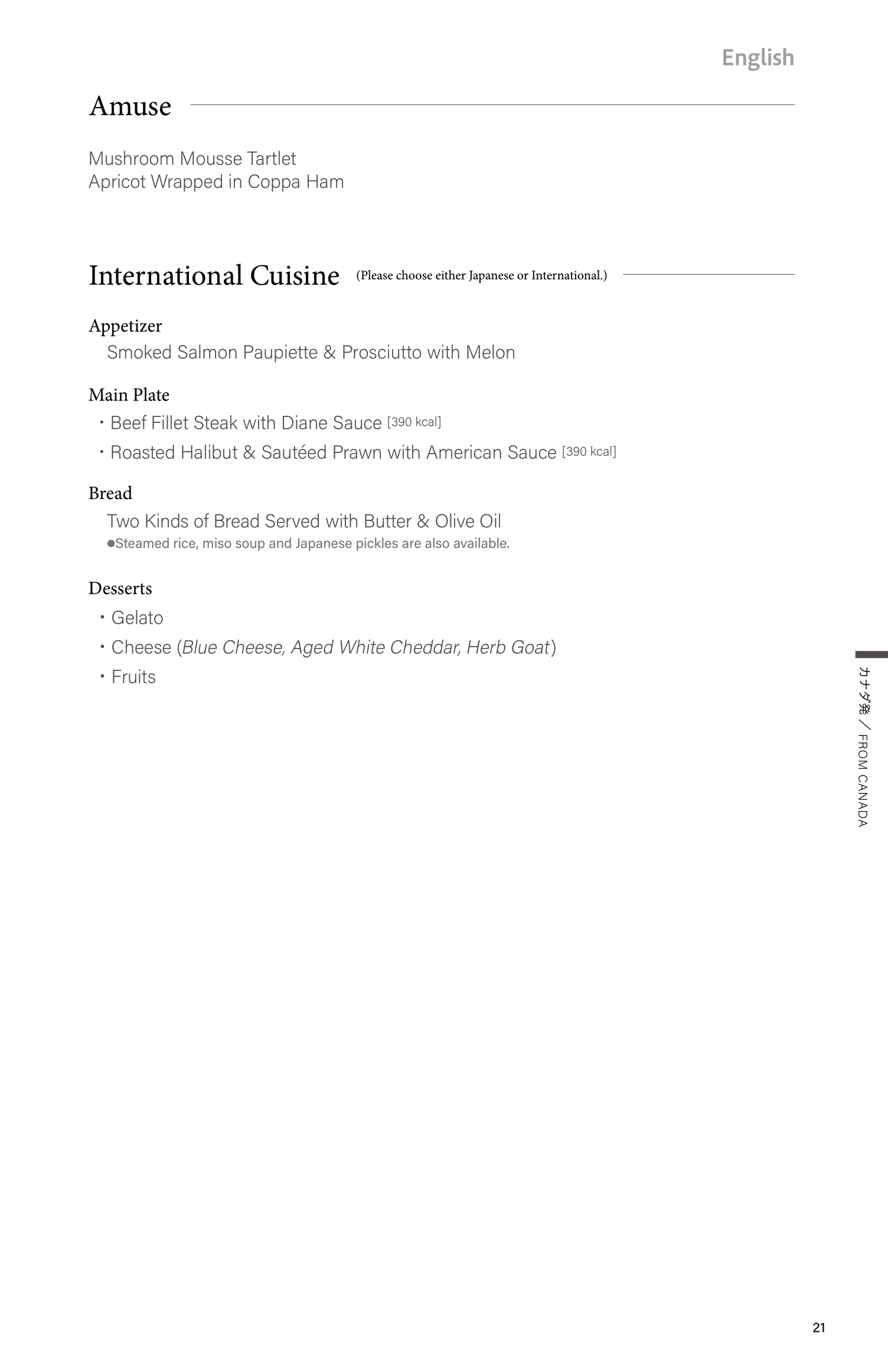
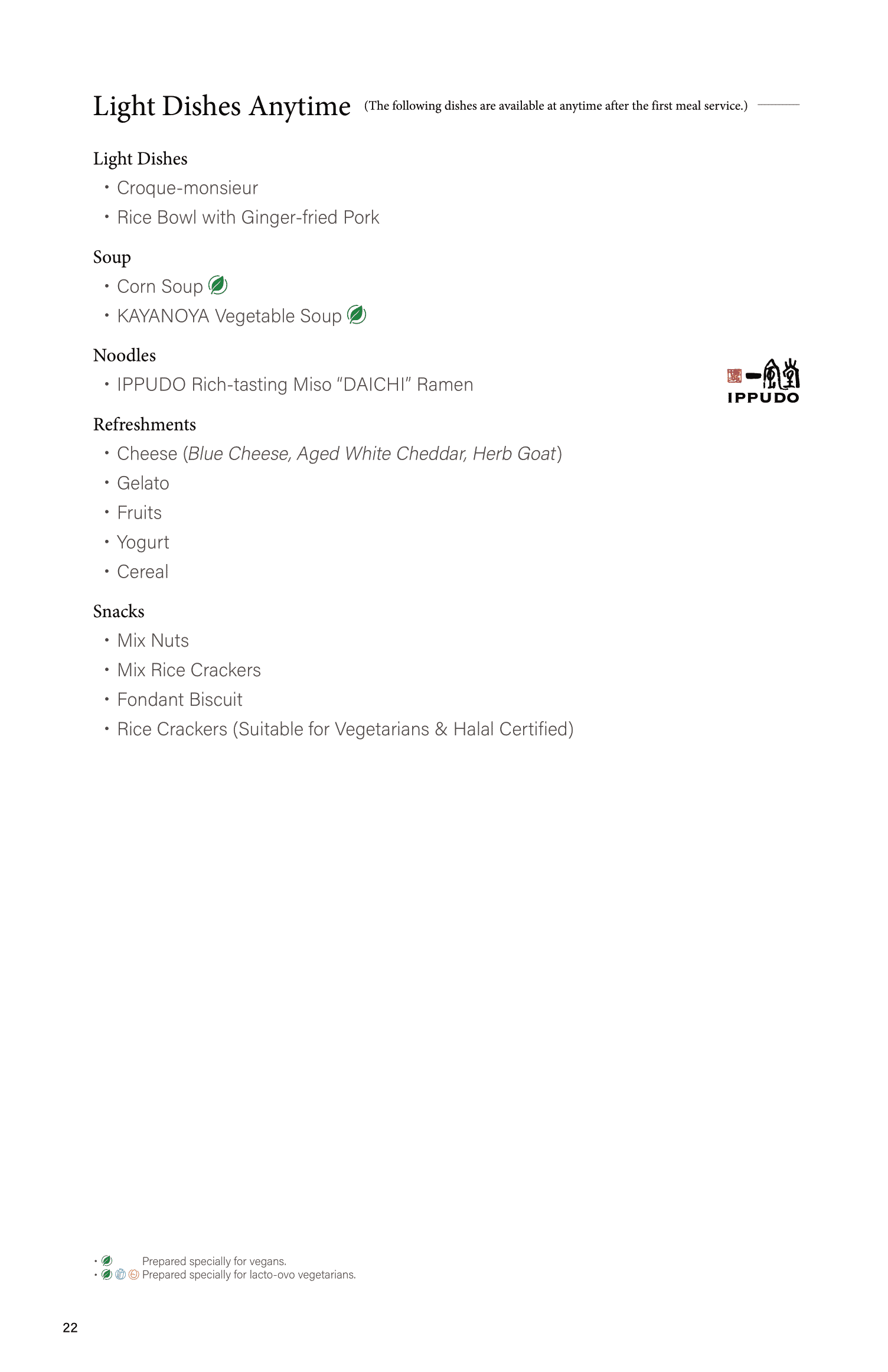
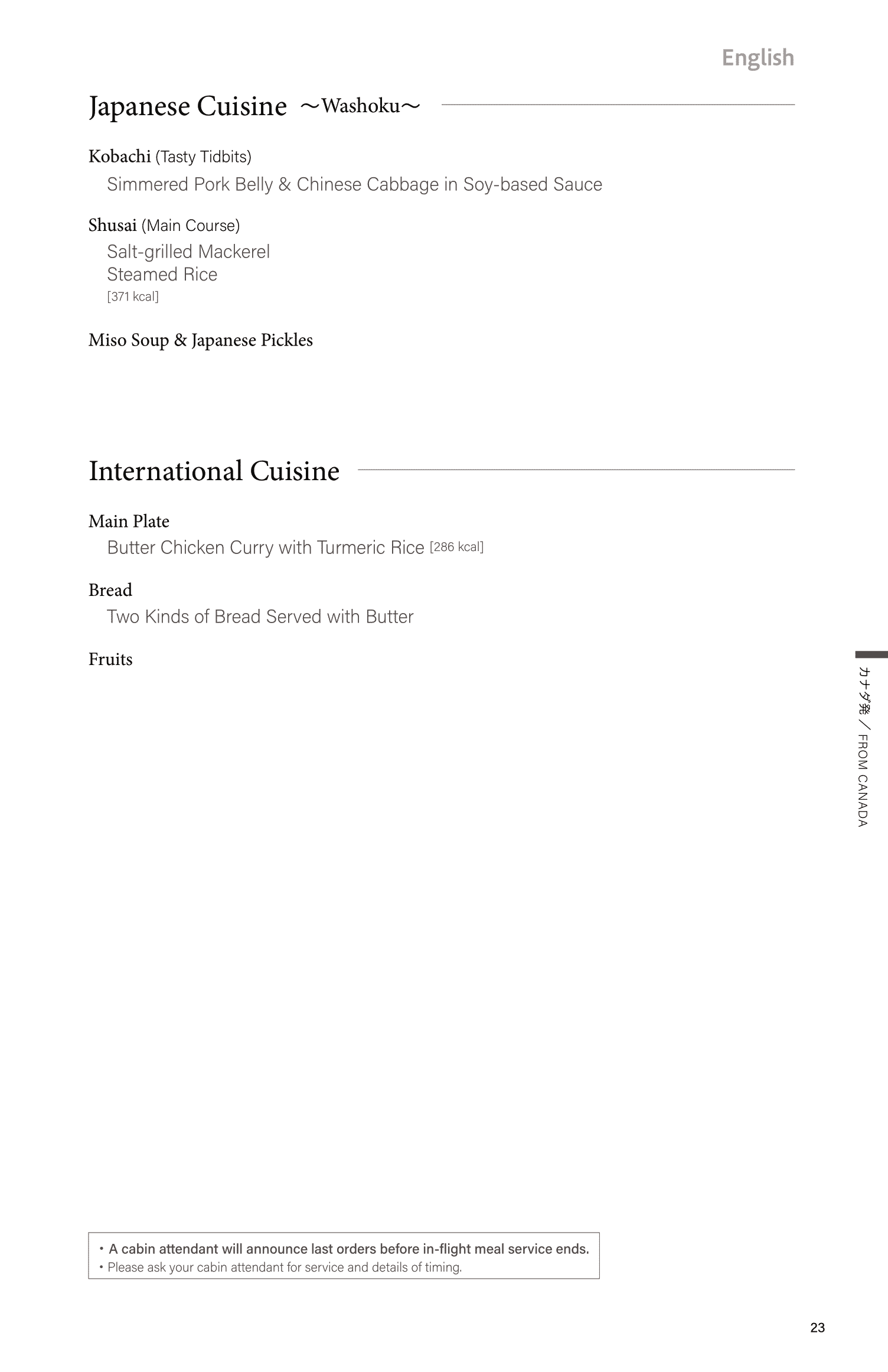
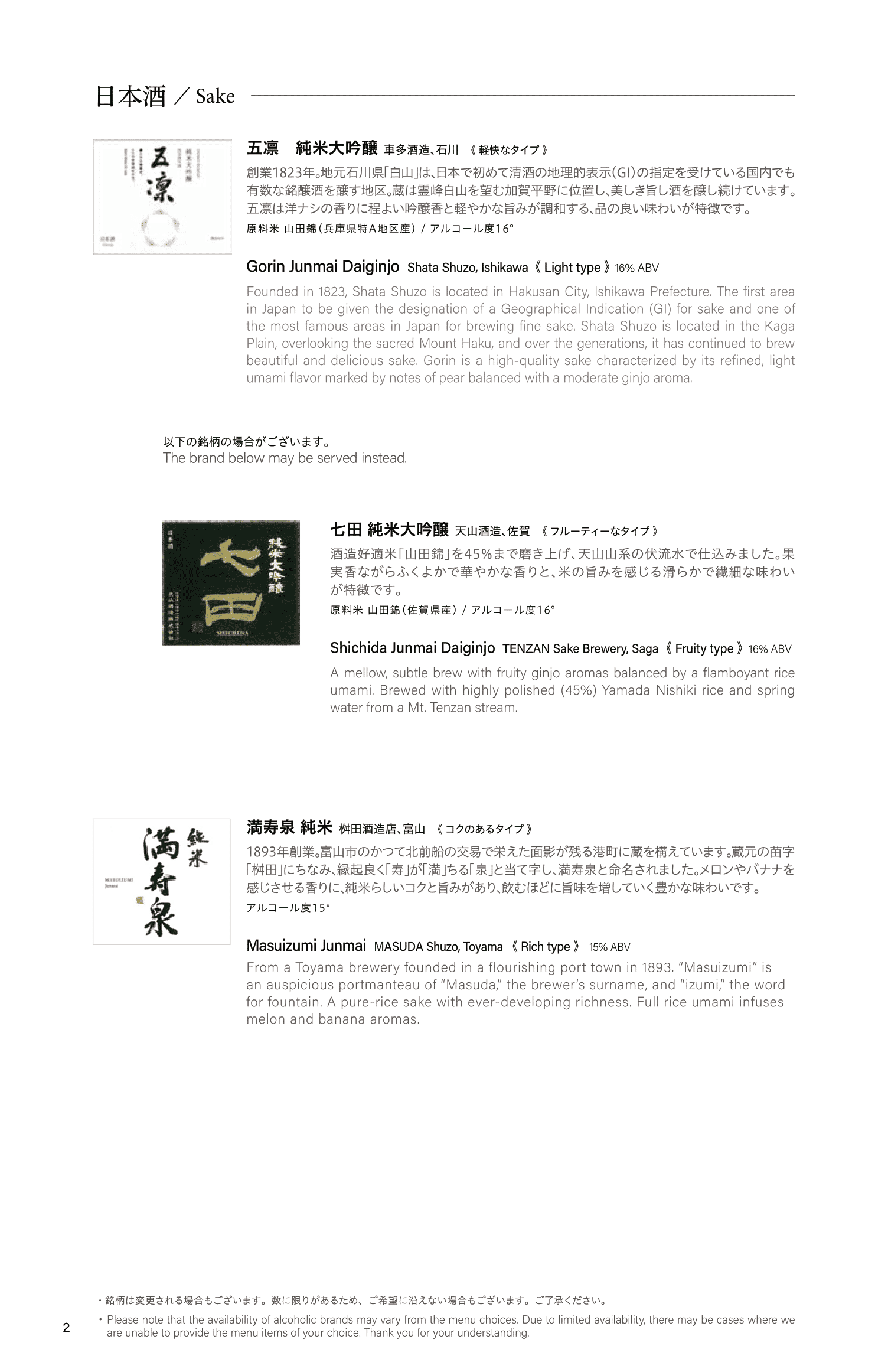
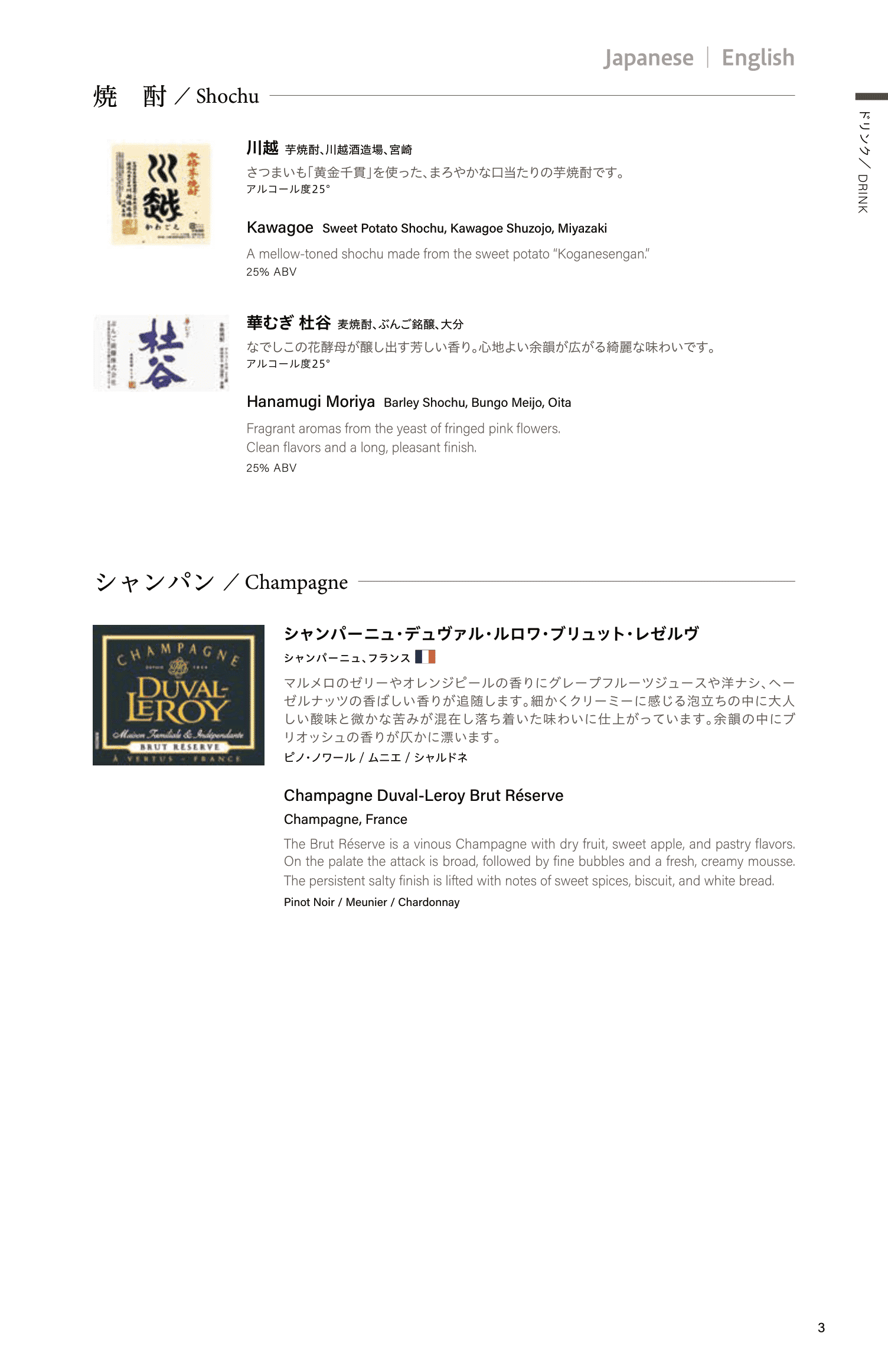
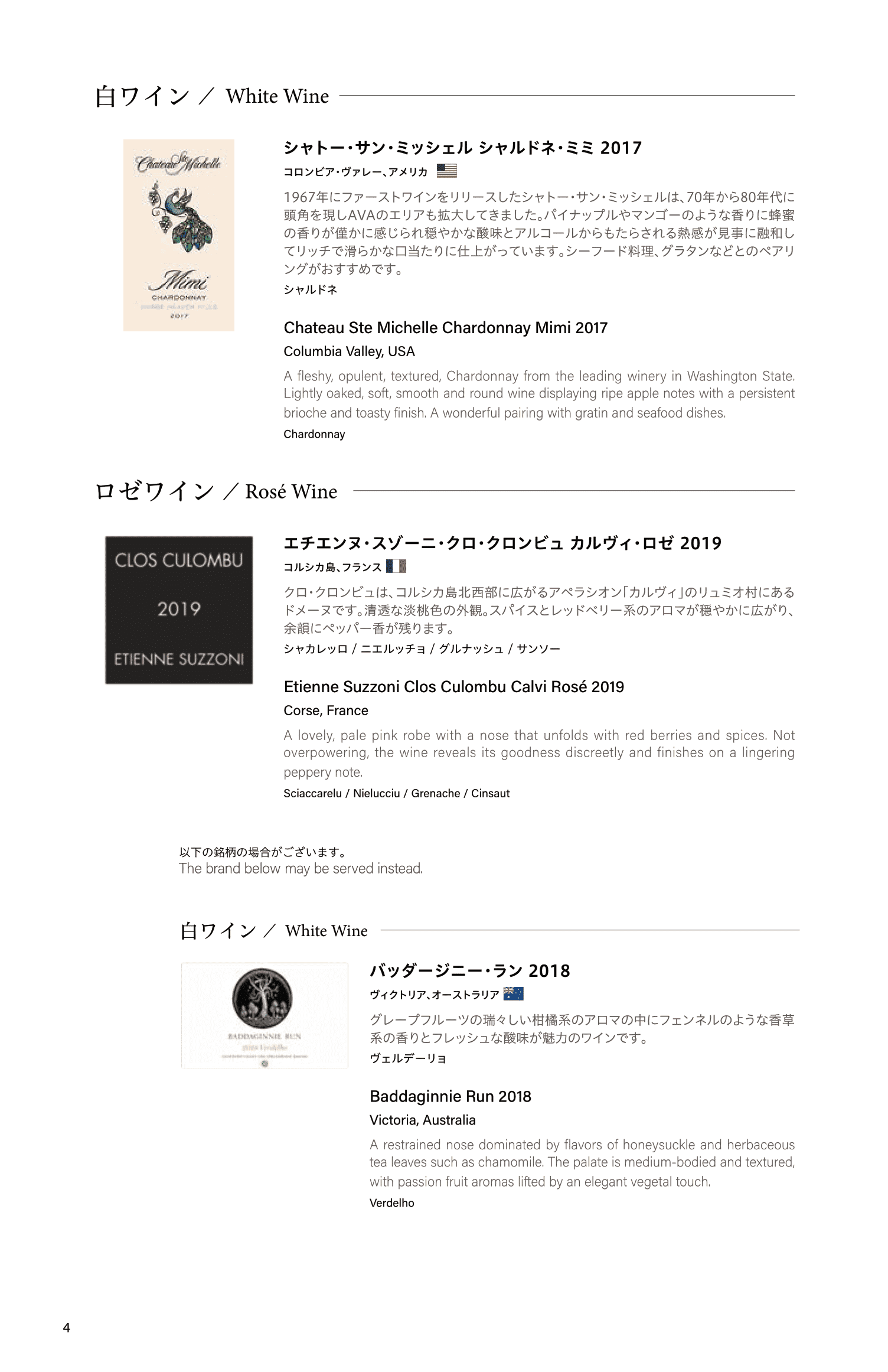
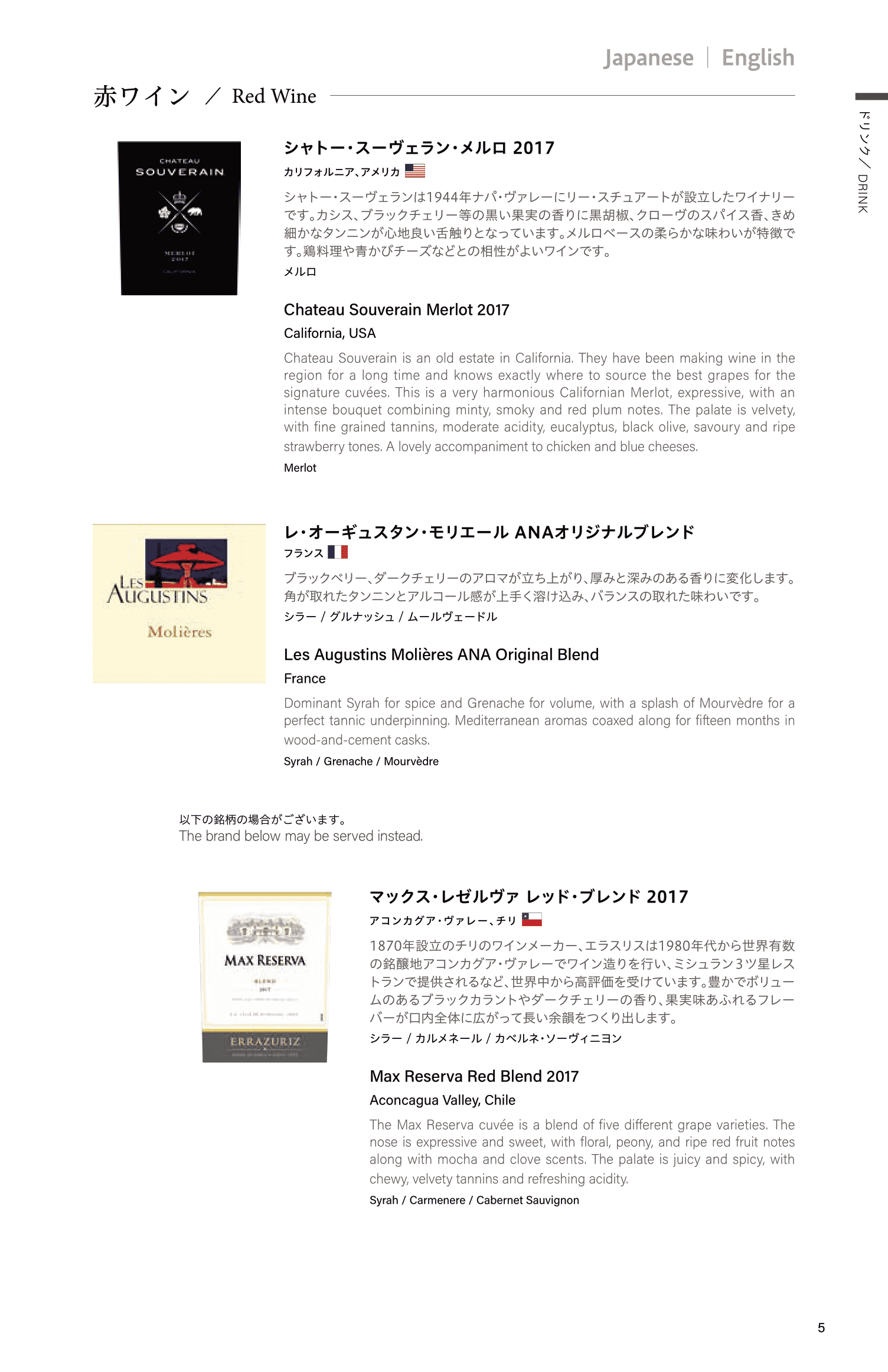
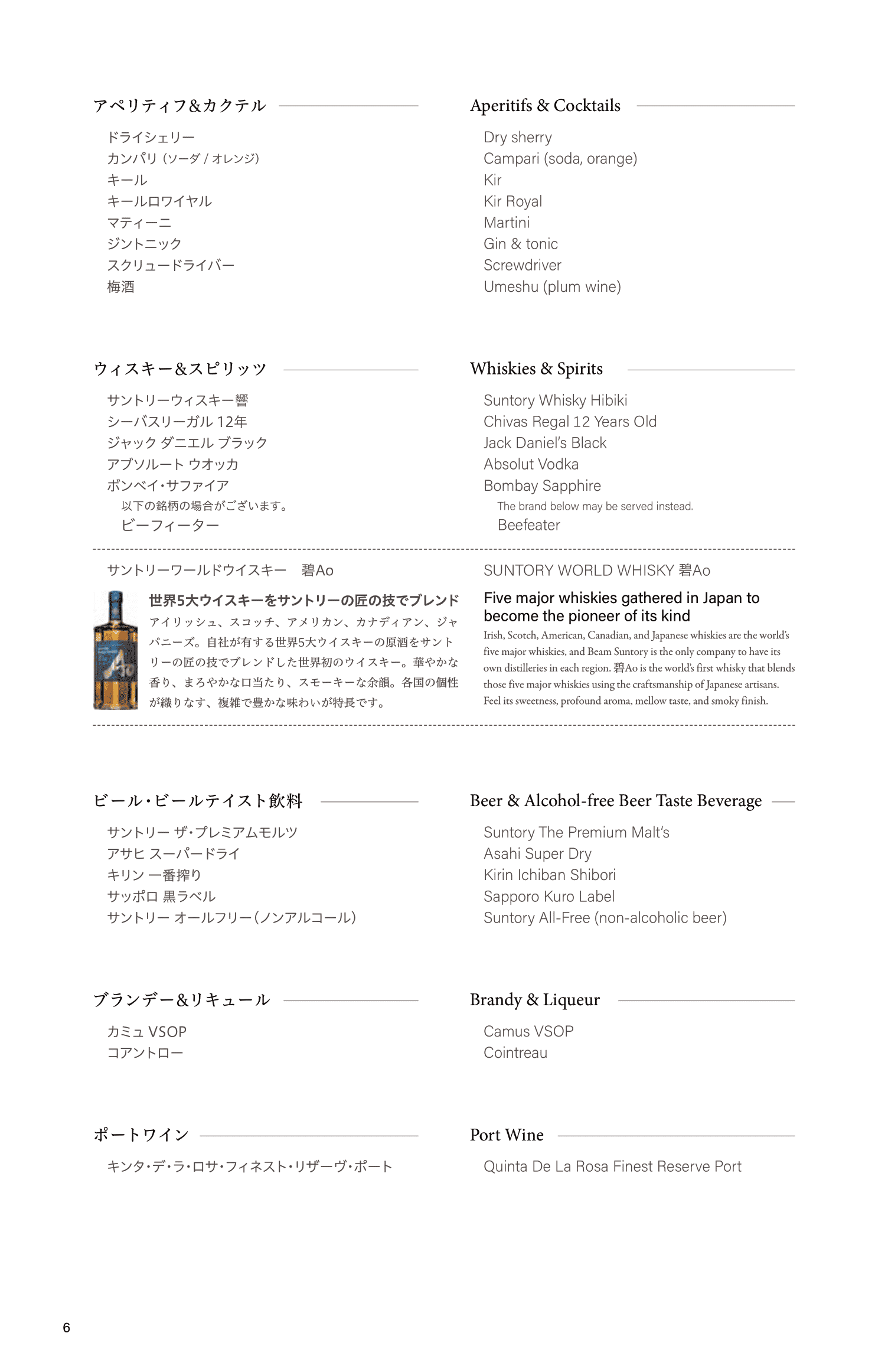
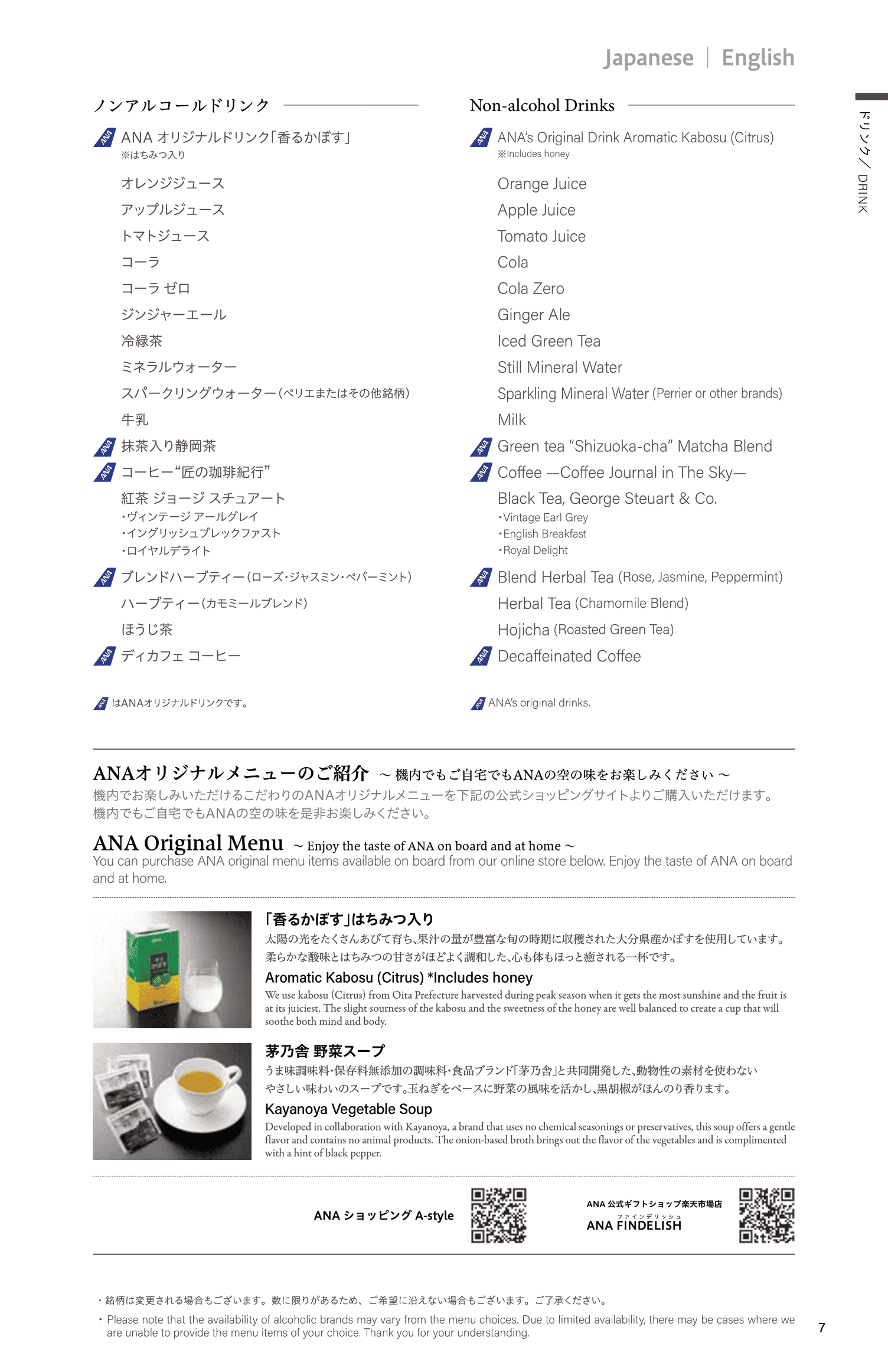








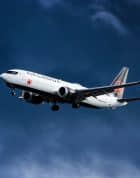
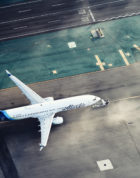



Thanks Ricky for the great review. Looking forward to our trip SFO-NRT-HAN in January, all in J on both 789 and 788. Hoping for upgauge to 77W by then.
Fingers crossed for you, the SFO route in particular has received a 77W a few times recently.
Hi Ricky, you chose to move to the smaller and hopefully quieter rear business cabin. Don’t you worry about noise from PC or Eco? In my experience there’s often a baby in the bulkhead seats behind biz or a child running through the curtains.
In this case, Row 8 was actually at the back of the main cabin, with few occupants around it in Rows 7 and 8. But in general, I do like mini-cabins too for their exclusivity, and I haven’t had too many bad experiences with babies in the cabins behind me (yet).